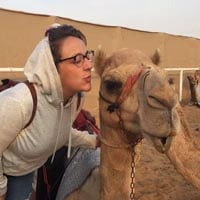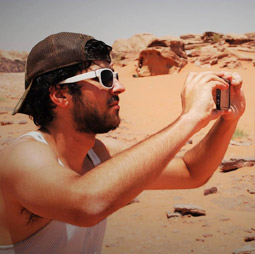Rocking Out With Refugees in Jordan
Written By: Adam Lucente | Updated: June 29, 2023
Written By: Adam Lucente
Updated: June 29, 2023

The glaring sunlight beaming into my window woke me up at around 9:30 AM. “Ugh, classes begin at 10:00,” I thought to myself that Friday morning. This is not an ideal time for a twenty-something ex-patriot living in Amman, Jordan. Like many predominantly Muslim countries, Jordan has a Friday and Saturday weekend, so Thursday night is a night to go out. However, I had agreed to teach a series of guitar classes lasting three hours every Friday morning for the next three months until I flew home to New York.
The classes were part of a weekend learning program for Syrian refugee children held at Jadal Culture, a café, but also more than a café near downtown Amman, Jordan’s capital. I was to teach these children guitar while incorporating basic English language into the lessons. The idea was to give them a fun, educational weekend activity - all for free. In this way, we could help the Syrian community, given their difficult situation.
I ended up in Jordan through a decision to teach abroad after graduation. After taking the International TEFL Academy’s onsite Teaching English to Speakers of Other Languages (TESOL) course in New York City in the summer of 2013, I got a job teaching English with AMIDEAST - an American NGO in Tunisia. After Tunisia, I moved to Jordan to continue teaching - again at AMIDEAST - while also working as a freelance journalist.

Learning about these classes at Jadal happened by chance, as adventures teaching abroad tend to. My friend, colleague, and bandmate, Olga, one day mentioned that she was volunteering with Syrian refugee children on weekends. She was teaching English, she said, at Jadal, which is a quite well-known place.
I jumped at the opportunity to assist. I hadn’t done any volunteer work at that point in Jordan, and found the prospect of doing so exciting. Olga and I were practicing with our band, Class Dismissed, when she mentioned her work with the kids to me. She was the singer, and I the guitarist. We had also taught together in the past. The name ‘Class Dismissed’ derives from the fact that all the original members were teachers. It therefore seemed fitting that I offer to teach guitar alongside her English classes.
There was only one problem: how could I teach dozens of children on one guitar? I remembered I had also bought the guitar of the other guitarist in the band who had since returned to the states. Moreover, I had a mandolin, which the students called ‘the little’ due to its size.
On that October morning, I slung my guitar on my back, carried my mandolin case in one hand, and carried my bandmate’s old guitar in the open air as it had no case in the other hand. Feeling like some sort of vagabond musician, I navigated the hills of downtown Amman until I reached Jadal and began my classes.
The classes were no walk in the park. From the first day, the students were rough with the guitars. The second I’d show up they would rush to take them out of the cases and start strumming them hard, sometimes banging them into chairs as they ran around. However, after instituting some ground rules and speaking to their parents, this problem more-or-less diminished over time.
Language was another issue. Olga did a fine job teaching them English, but she only had an hour a week with each group of students, and these classes had only begun a short time ago. In short, few of the students could converse in English before starting the program. In my case, I was supposed to introduce words like “pick,” strum,” and “chord” to students who barely spoke English. I ended up teaching them in a mix of Arabic and English, using any extra time we had to chat with the more advanced students in English, thus giving them additional conversation practice.
Slowly, some of the students began to learn. Amr (names have been changed for privacy reasons) could switch between chords after a few weeks. I can only imagine what he would’ve learned had he had a guitar at home. Elias, who struggled in other subjects, could repeat notes after me and play part of “Lm3allem,” a huge hit in the Arab world at the time.
My schedule made it difficult too. One day, an expert I had arranged to interview by phone for an article suggested we speak Friday. I screwed up the time difference calculation, and accidentally scheduled our call in the middle of my classes. Not wanting to cancel either, I put some chord charts on the board and stepped outside to interview him for about ten minutes, jotting down his insights as we ironically discussed the situation in Syria which compelled my students to leave there in the first place.
I don’t know how much learning guitar really benefitted the students in the long run. One student was in the process of immigrating to Sweden, and I knew knowing a G chord would not help her much with that. But the English, math, and Arabic classes at Jadal certainly help the students with their school studies. As for guitar, I know they had fun, and I hope I showed the more promising students like Amr a musical side of themselves they previously did not know.
Teaching those kids made me reflect on how different circumstances of birth make people. I’ve since flown home to the U.S. and back to the Middle East, while many of the students are still in Amman, not necessarily by choice. However, I am a firm believer that kids need fun, and I believe Jadal provides them that.
Jadal still holds classes for these students. Unfortunately, as I left Jordan, so did one of the guitars and the mandolin, and there is no longer a guitar class. However, Olga and the other teachers now incorporate music into their lessons. If you’re ever in town, I encourage you to stop by Jadal to have a delicious Turkish coffee, learn some Arabic, or chat with their staff on the plethora of great events they host.
Wherever teaching leads you, I trust you’ll find rewarding ways to engage with your host community. That’s part of what teaching abroad is all about, no?
Posted In: Teach English in Middle East, Teach English in Jordan, Amman
Adam Lucente
Adam Lucente is a journalist and English-language teacher from New York City. He learned Arabic in college and has since taught in Tunisia, Jordan, and the Kurdistan Region of Iraq. As an ITA Alumni Ambassador, Adam has shared many of his experiences and insights with others interested in teaching in the Middle East through numerous articles.
Want to Learn More About Teaching English Abroad & Online?
Request a free brochure or call 773-634-9900 to speak with an expert advisor about all aspects of TEFL certification and teaching English abroad or online, including the hiring process, salaries, visas, TEFL class options, job placement assistance and more.
"The Middle East is a very fascinating and unfortunately an extremely misunderstood area by so many. In a lot of ways, it’s an extremely easy place to adjust to, Western luxuries are quite accessible and almost everything is in English and Arabic."

- Katie Ayers
Teaches English in the UAE







